Chris & Allyson vs. Europe (2013)
Dusseldorf: A business city. The Rheinturm. Apollo cabaret. Benrath Castle. Depeche Mode.
Dusseldorf is the Indianapolis of Germany. Lots of people are from there, it's a perfectly nice place to live, and no one really wants to visit. As of 2012, I hadn't heard of it. Or if I had, I'd forgotten. Because Dusseldorf doesn't come up much in polite conversation.
It came to my attention when Depeche Mode decided to play a soccer stadium there in the summer of 2013. Allyson is a big fan, and the concert would be close to her 35th birthday. It seemed like a novel way to kick-start a vacation. So for the first time in recorded history, Dusseldorf became the centerpiece of an American's vacation.
We came to the town by train, from Amsterdam -- just a few hours down the line. It was an orderly, clean journey, because that's what European rail travel is supposed to be like. "Orderly" and "clean" are really the only ways to get around in Europe. American tourists in Washington can't figure out the subway system, which is presented entirely in their language. It took us five minutes to figure out how to take trams, with German signage, to a hotel in a city we'd never been to before. Why did we ever look sideways at the Germans?
Oh, right. But still, great transit.
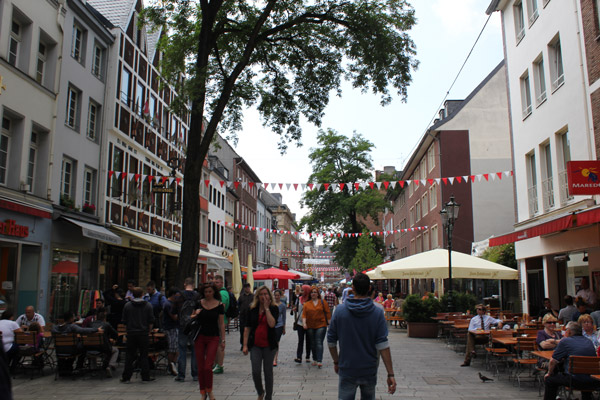
Downtown in Germany's business city.
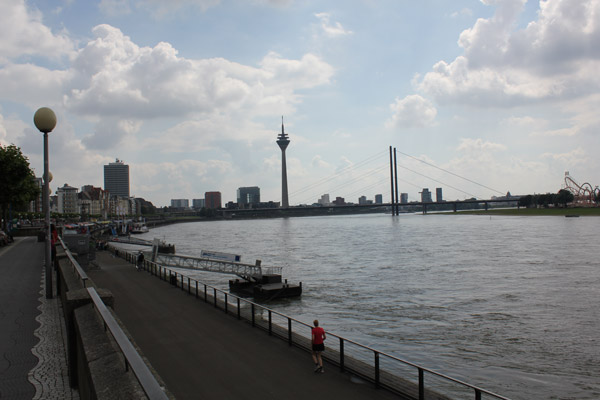
The wide view of the Rhein waterfront.
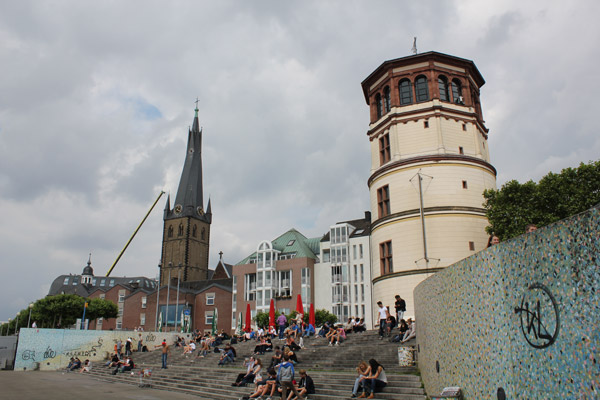
People lazing about, in true German style.
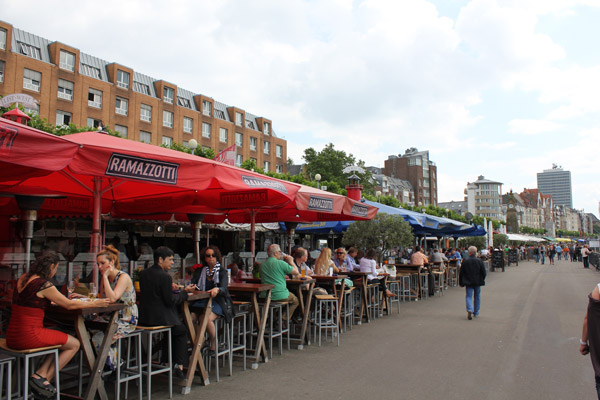
"The world's longest bar," or one of them at least.
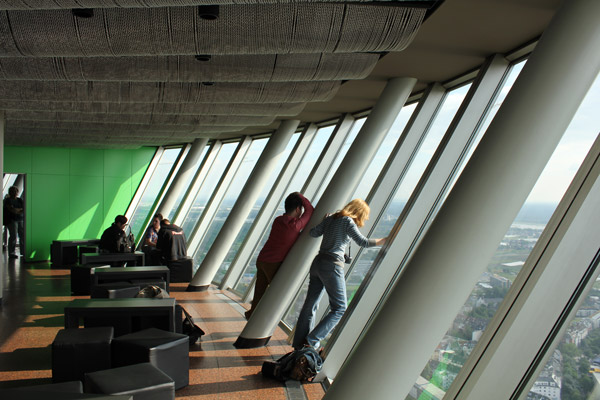
The observation deck of the Rheinturm.
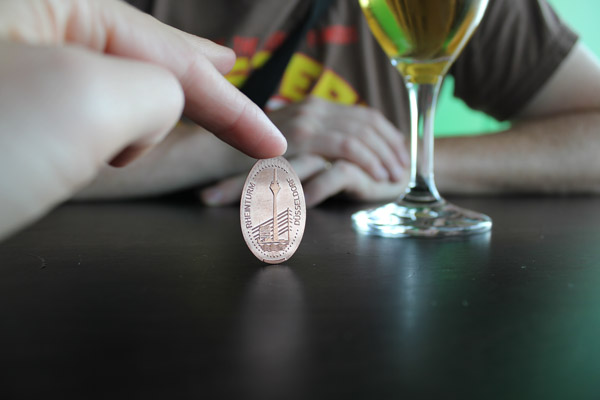
Having a drink at the Rheinturm bar.

Underneath a bridge, the Apollo cabaret awaits.
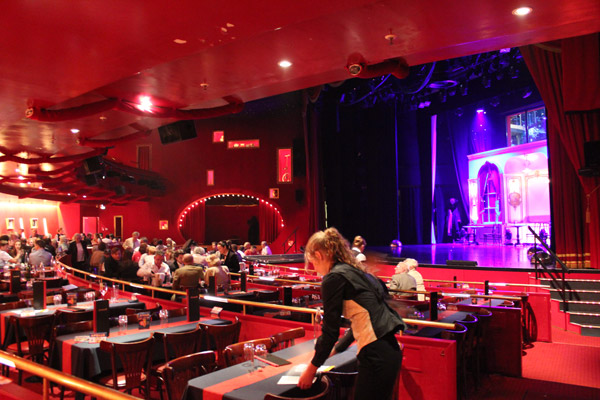
A few minutes before a very impressive cabaret show.
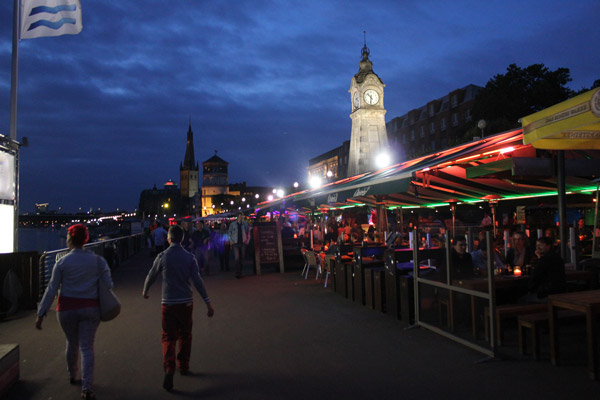
The bars on the Rhein waterfront at night.s
Dusseldorf is a business-oriented city, which means that despite its long and storied history it doesn't have much in the way of museums. We spent our first afternoon mixing in with the lunch crowd, walking along some very pleasant main arteries, checking out the fountains and window shopping at all the luxury stores. Looking back at the pictures five years later, everything seems nice, but nothing seems memorable. The only exception is the "cartwheeler," the symbol of Dusseldorf. It is featured in public art, etched into manhole covers and emblazoned on souvenirs. Is there a great story behind this symbol? Not one that people can agree on. It's just a thing. Deal with it.
If you leave humans in a city with not too much to do, eventually they'll find their way to the water -- it's where all the best criminals hang out, or it's the traditional highway to the next city. We found ourselves walking along the Rhine, and the parks along its banks. That brought us to the other default human-in-a-city activity: Finding the tallest building and going to the top.
The Rheinturm is a giant TV and radio antenna, and enterprising Germans put a revolving restaurant and observation deck near the top. While bombarding you with EM radiation, it offers a very nice view of the river and the city, and we stopped to have a drink at the bar. (Pro tip: When in Dusseldorf, don't order a kolsch, which is apparently the signature beer of arch-rival Cologne. You will get a dirty look. And no kolsch.)
We rounded out the day with show at the Apollo, a venue tucked under a bridge near the Rheinturm. It was slightly different than the American Apollo, in that everyone in the audience was white, a lot of the crowd was river cruisers, and the show was completely in German. Dusseldorf isn't a tourist city, so they don't try that hard to accommodate English speakers. Sure, every German in town speaks English -- but they don't need your money.
Fortunately, you don't need to understand German to enjoy a cabaret act. It was Cirque du Soleil light, with excellent acrobatic performances. The highlight had to be a sleight-of-hand specialist who successfully relieved an audience member of their glasses without the audience member noticing. Who said the Germans are all about brute force?
Our second concert in Dusseldorf wasn't until the following evening, so we had to fill another day. We recharged our batteries at the Novotel -- it's not just for Swiss business travelers anymore -- thumbed through our Dusseldorf guidebook -- yes, such books do exist, although they're small -- and settled on Benrath Castle.
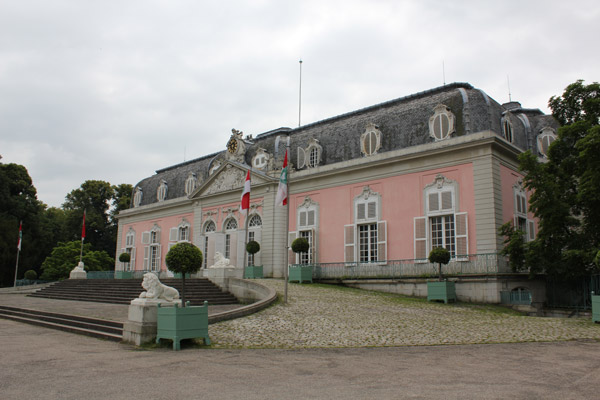
Benrath castle, home to the world's least friendly tour guide.

A former hunting estate, turned into a pink pleasure palace.
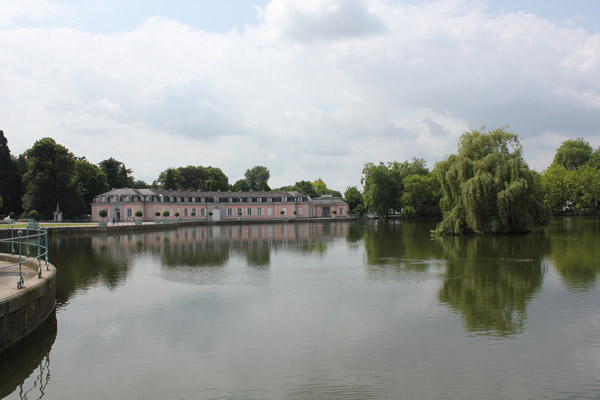
The lake on the Benrath castle grounds.
Some castles are defensive in nature. Some are meant to project authority. Benrath is neither of these; it's what you'd call a "pleasure palace." A rich guy wanted a place to relax in the summers, that was also a suitable demonstration of just how rich he was. It's not historically significant, but it's supposed to be pretty. We took a long tram ride across the city, winding up in a very arboreal neighborhood. A few minutes after stepping off the train, we were there.
It's pink, which is not something you can say about most castles or palaces. Especially the German ones. We were there 40 minutes before the 1 p.m. tour, so we got our tickets and walked around the gardens. We were back by 1, at which point the perturbed front desk attendants told us the tour had left without us. Early. That's not something you can say about most tours. Even the German ones. No one seemed that worried about helping us, but we eventually found a sour-faced groundskeeper who let us into the building and helped us catch up with the sour-faced tour. The guide informed us in perfect English that she absolutely would not translate for us, as the other eight people in the group were German. Even two-sentence descriptions of the room were out of the question. So our memories of the interior (no pictures allowed) are that it was vaguely nice. And they made you wear some giant shoe-covering slippers so that you wouldn't damage the antique hardwood floors. That was kind of fun.
But the lesson we learned repeatedly in Dusseldorf is that hospitality isn't a given. Alcohol is, so we went back to the Rhine to check out the "world's longest bar." This is absolutely an exaggeration; it's really just a string of waterfront restaurants. But I was able to buy and eat a frankfurter, without getting a kolsch-like death stare. With that, it was time for Depeche Mode.
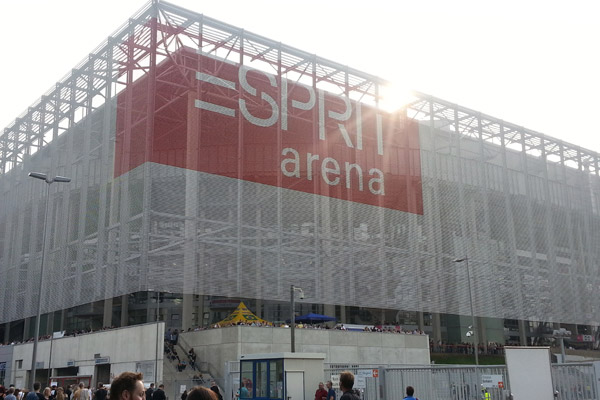
Our venue for Depeche Mode was a soccer stadium.
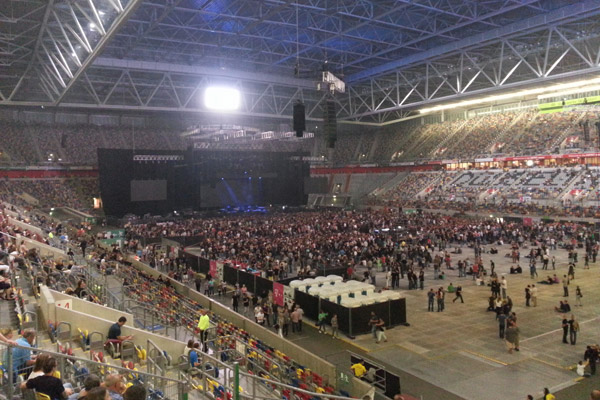
Setting up for the Delta Machine tour.

The lights and glamour of Depeche Mode.
The concert was at the Esprit Arena, one of the mid-sized soccer stadiums that every mid-sized European city must have, by law. This was settled in the European Union's charter, and it is the most sacred law of the continent. The crowd showing up to see Depeche Mode -- in America or Europe -- is middle-aged and white. The crowd also drinks a lot of beer. There was a decent enough opening act at 7:40, then a house-music interlude before Depeche Mode took the stage around 9. The "Delta Machine" tour had a mix of new stuff and greatest hits, some great stagecraft and thousands of Germans singing English lyrics in perfect unison. They closed with Allyson's favorite song, "Never Let Me Down," and we wind-sprinted back to the train. Beating most of the crowd, we were back at the hotel by 11:45.
Looking back, our two days in Germany were a nice representative sample. We enjoyed beer, marveled at German efficiency, experienced classic German hostility, and sided with invading Englishmen. In representative American fashion, we also learned very little about the place we were visiting. Allyson even snagged a soft pretzel at the train station as we were leaving town. It didn't inspire her to turn a cartwheel, but what can you do.
